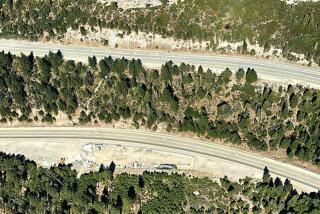Boeing 787 Dreamliner catches fire; stock takes a beating
Just as Boeing Co. and its 787 Dreamliner looked to be taking off again, another fire onboard the signature new passenger jet has brought the resurgence to a halt.
A 787 — one of 68 delivered so far by Boeing — that had been sitting at a remote parking stand for more than eight hours at London’s Heathrow Airport caught fire Friday. No one was onboard the Ethiopian Airlines plane and no one was injured, the airline and an airport spokeswoman said.
Boeing shares swerved on the news, falling as much as 7% before rebounding slightly to close down 5%, or $5.01, at $101.87 as analysts said the incident didn’t appear related to the battery troubles that grounded 787s worldwide earlier this year.
FULL COVERAGE: Boeing’s troubled Dreamliner
But the shares continued to whipsaw later in the day as Britain’s Thomson Airways said shortly after the Heathrow fire that it forced one of its Florida-bound 787 flights back to England as a precaution after finding unspecified “technical issues.” It began flying long-haul 787 flights this week.
Boeing has hitched its fortunes on the 787, a long-range, wide-body plane considered an engineering marvel. Its carbon-composite exterior and technical designs make it extremely fuel-efficient, an attractive quality for airlines at a time of high fuel prices. Airlines have ordered 930 Dreamliners, making it one of the most coveted commercial jets.
But the aerospace giant hit turbulence in January when federal regulators banned all 787 planes from flying for four months after batteries on two planes overheated, with one catching on fire.
Boeing later ordered modifications to the jets to increase ventilation and insulation near the batteries, but the company and investigators never determined the root cause of the overheating. In April, Ethiopian Airlines became the first carrier to resume flying the aircraft. In May, Boeing sped up 787 production, hoping to increase monthly deliveries from seven to 10 by the end of the year.
Richard L. Aboulafia, director of aviation consulting for Teal Group Corp., said Friday’s fire didn’t appear to take place near the battery. Although that could be welcome news for Boeing, he said the bouncing share price showed how dependent the company is on the 787.
“You only get to launch one new line a decade,” Aboulafia said. “There’s an awful lot riding on this.”
Boeing staff and a U.S. National Transportation Safety Board representative were at Heathrow investigating the incident. The company said in a statement that it is “working to fully understand and address this.”
Heathrow closed both of its runways for 90 minutes, delaying flights. Images from the scene showed emergency vehicles with fire-retardant foam sprawled across the ground.
There appeared to be fire damage to the top of the plane near the tail, analysts said. Previous incidents of fire linked to the lithium-ion batteries have centered near the belly of the plane.
Analysts offered several possibilities for the cause of the fire at Heathrow.
Wayne Plucker, the lead aerospace industry analyst for Frost & Sullivan, said the plane might not have been receiving air conditioning at the time.
“Any time you have an airplane parked and powered and under maintenance, the electronics take a real cooling challenge,” he said. “They could have been running all the electronics without all of the air conditioners on.”
The Dreamliner has an unconventional internal design. The plane has two avionic bays where key electronic equipment is based, compared with one for most jets, and there is far less wiring, Plucker said.
“All of this is somewhat new and I’m not sure all the maintenance folks know the implications and completely understand what the needs are of the airplane,” he said.
Scott Hamilton, an aviation industry consultant and managing director of Leeham Co. in Issaquah, Wash., also said the fire could have been human-induced or a system failure.
“Until some details emerge, it’s too soon to speculate the impact to the airplane program or to Boeing,” he said.
Analysts said every new plane industrywide has had a minor electronic malfunction. But Tom Captain, aerospace analyst with the financial firm Deloitte, said those incidents are occurring less often.
“Recent news about aircraft incidents draws attention partly due to the rarity of these types of events in recent times,” he said.
Twitter: peard33
Times staff writer W.J. Hennigan contributed to this report.
More to Read
Inside the business of entertainment
The Wide Shot brings you news, analysis and insights on everything from streaming wars to production — and what it all means for the future.
You may occasionally receive promotional content from the Los Angeles Times.











